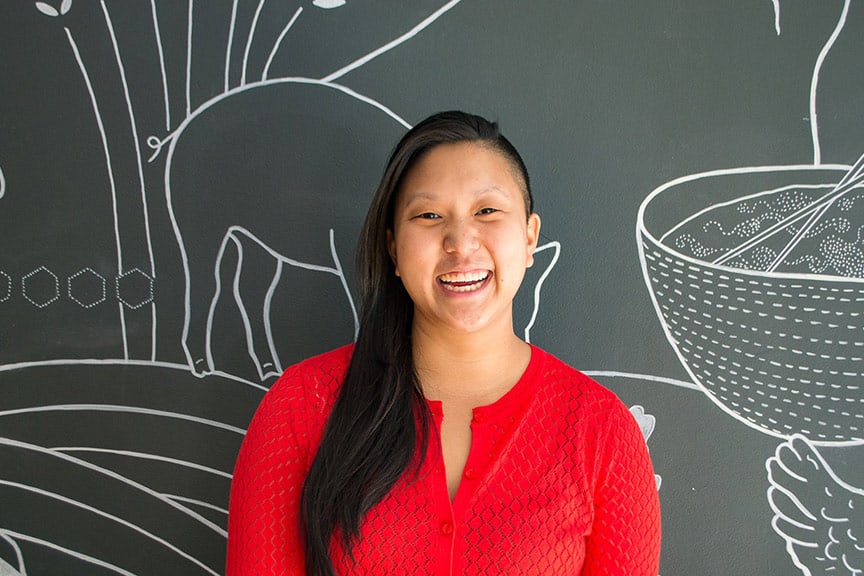
It’s hard not to get excited (and hungry) when you listen to Irene Li talk about Mei Mei, the restaurant she co-owns with her brother Andrew and her sister, Margaret. I got a real “joy hit” as she explained the siblings’ commitment to using sustainable, locally-sourced food and treating employees fairly. Intrigued, I did a little research. Because I am such a conscientious reporter, I also forced myself to eat at Mei Mei twice. It’s a hip little counter service place located in the heart of the BU campus and the Chinese American food is absolutely delicious. I discovered that, in addition to directing operations at the restaurant, writing for WBUR’s the Artery, and promoting Mei Mei’s new cookbook, Double Awesome, hot off the press this month (and already covered in flour and sesame oil in my kitchen), Irene is very active in her community and sits on the boards of several nonprofits. Among many other honors, she was named a James Beard award semifinalist last week. Irene was generous enough to grant me an interview, paraphrased below.
KS: I hope it’s fair to say that the heart of your business model is creating great food ethically. It’s abundantly clear that responsible sourcing and fair employment practices are just as important to Mei Mei as running a profitable business, and yet it is no secret that making ends meet in Boston’s complicated restaurant world is extremely tough. What have been some major challenges you have faced in honoring your values as Mei Mei has grown?
Irene: Reconciling local sourcing of ingredients with the demands of being a food service provider has been very challenging. Thirty percent of our business is catering; unlike running a restaurant, for catering, you need to know that you will receive exactly what you ordered, and sometimes you need to be able to get ingredients on short notice. So we had to start sourcing differently to accommodate this. We try to source locally at least 6 months out of the year. That was a mindset shift. As we grow, we are hoping to get more influence over our food supply chain so that we can source whatever we want, whenever we need it – Clover is a great example of a business that has been able to do this.
The other really significant challenge has been figuring out how to pay people what they are actually worth, and this is an ongoing project. Open Book Management has really helped us demonstrate the role of pay in the context of running a restaurant overall. We know that anyone who works for us might be able to make more money somewhere else. So we are always thinking about what else we can do to make employees want to choose to work here.
KS: This is a perfect segue to my next question. Can you tell me a bit more about what you are doing to promote transparency and fairness in an industry where employees are somewhat notoriously undervalued (and underpaid)? To what extent, if any, do you think this might contribute to the restaurant’s success? (Or is it just that you make the best dumplings I’ve ever tasted?)
Irene: For us, being a good workplace is a culmination of a lot of different things . One thing we really emphasize is making sure people are not working 60-70-80 hour weeks. We refuse to treat people as dispensable. This is not necessarily the standard in our industry. One thing we do is we try to honor time off and vacation requests. We understand our staff have other passions and interests, including career development and education. We work really hard to accommodate that. Scheduling is a big challenge all the time and that probably won’t ever change. And then pay is a huge factor. We also started offering health insurance for full time employees. Finally, with our business and management training, we are really trying to create opportunity and teach skills that people can take elsewhere. Employees appreciate the value in that.
We have really loyal staff. Attracting different employees – smart, motivated people who want to learn about business – is a measure of the success of these efforts. And it’s a self-fulfilling cycle: our training helps us attract smart and interesting people and they want to stay with us.
KS: I am so impressed by what you’re doing at the restaurant around sustainability and responsible sourcing of your ingredients. I read that you lived on a farm at some point. How did that experience inform Mei Mei’s practices?
Irene: I lived on a farm for five months in high school. We took care of animals, cut down trees, harvested crops, romantic farm stuff. I was not super interested at that time in being a farmer, but it still shaped me. I have strong memories of feeling like being part of a very closed loop at that time: the person who picked the asparagus and the guy who collected the eggs were sitting across the table at dinner. This was very formative with respect to my thinking about how the process of creating food is a real community. Not to mention that the closer you are to your food source, the better it tastes. I really only “dabbled,“ but it taught me how difficult and unglamorous a farmer’s life is, giving me a real appreciation for the people who grow our food.
KS: Your new cookbook is fabulous – so beautifully written and photographed! What an undertaking on top of running the restaurant (and taking time to talk out to unknown bloggers). I know you sit on some boards and are otherwise very active in the nonprofit world as well. Do you have any advice for would-be social entrepreneurs out there who might want to pursue a similar business model but find what Mei Mei is doing simultaneously inspirational and overwhelming?
Irene: Well, the first thing I should say is that my sister really took on the cookbook; my number one bit of advice for people is if you meet or happen to be related to someone amazing who shares your values, grab them and keep them close. I’m very sentimental about relationships and have always prioritized personality over skill. When I meet a potential hire, I think: Are they excited? Do they seem smart? Not: “Do they know how to cook?” I think this is one reason our first managers stayed five years. They were people you could rely on who knew how to think and make the kind of choices we would make. This is a real transitional challenge for small business owners. How do you delegate and trust others? I have my siblings who I trust with my life which has given me the freedom to do all these other things. I definitely have a full life, but I still watch plenty of Netflix. I love true crime. I watched the entire Ted Bundy series the day it came out. But seriously, I make time for what’s important to me, and that does not feel like “work.” For example, I do a lot of nonprofit work and rather than that feeling like more being piled on, it really helps balance me and gives context to my regular work; going to a board meeting is a welcome break from what I’m doing at the restaurant, and, at the same time, being there is a reminder of the value of my day job because it allows me to contribute in this way. Find the stuff that brings balance and fills your tank. But certainly, I’m a manic crazy person too.
KS: For readers who are inspired by what you are doing, there are some obvious and extremely pleasant ways they can support you (see below). Are there any other ways readers can show their support for your business or, beyond that, the kinds of values and practices that Mei Mei promotes?
The number one thing I would say is be selective about the restaurants where you spend your money. For example, February was the Boston Black Restaurant Challenge. That’s the only time of year we are thinking about who owns the businesses that feed us but even that is a huge improvement. It’s hard to tell if a restaurant is really doing farm to table. I love when we get challenged about fair pay, organic, etc – I want that to be a conversation we are having all the time.
I’d also add there are a ton of community organizations that need support. For me, finding projects that I identify with most has been very fulfilling. Especially for people my age, forming a relationship with a community organization is really valuable. There is a lot to be said for the opportunity to connect with people outside of your workplace and come together around values and concern for public issues. Pick your organizations, find your people, and that is a huge investment in your community.








Leave A Comment